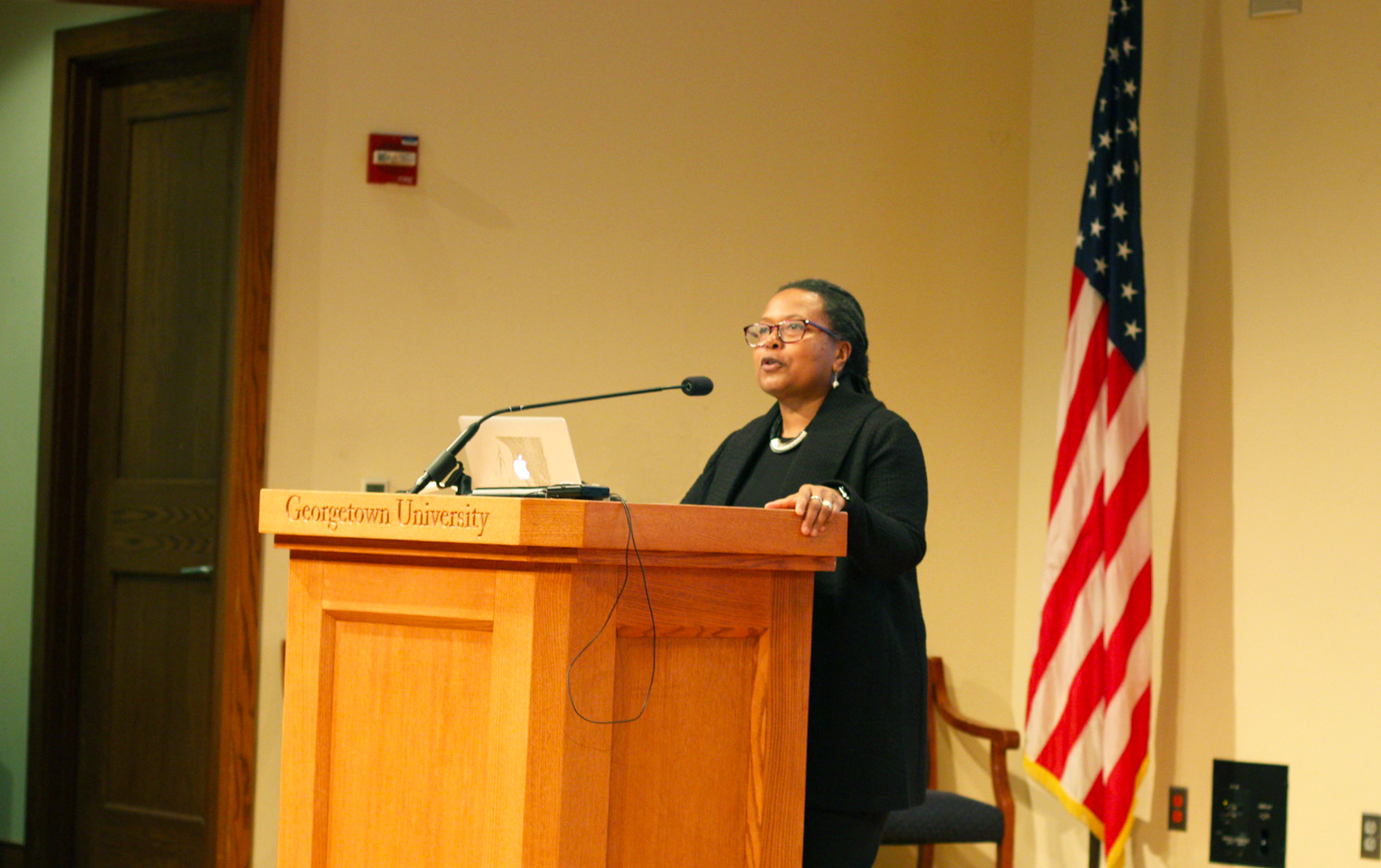Department of African American Studies hosts lecture on Black Resistance in the Digital Age
The Georgetown College Department of African American Studies hosted a lecture on Thursday that discussed how black activism can utilize the digital tools to promote their message and mobilize support.
The lecture, titled “Black Resistance in the Digital Age—From Twitter to Black Queer Feminism” was the latest installment of The Ella Jo Baker Distinguished Lecture Series and featured University of Chicago Professor Cathy J. Cohen.
How digital media can be an incubator for resistance
The award-winning author and political science professor began her speech by acknowledging and honoring the legacy of Ella Jo Baker.
“I think anyone committed to the liberation of black and oppressed people, work in the tradition of Ella Baker,” Cohen said. “We know she was a brilliant strategist, an incredible organizer, a fierce warrior in the struggle of course, and someone who believed, first and foremost in the power of people acting collectively.”
The speech focused on two main themes, the first of which looked at the transformation of information spreading through digital media and its impact on the black experience in America. The second topic evaluated how black people, particularly those in the feminist and queer communities, have used these new tools to elevate their voices.
In particular, Cohen discussed how the digital domain has shifted who is able to contribute to the spreading of events involving acts of violence against black communities.
“What’s different I think in this moment, is the nature of who is taking the video or picture, the type of device they are using and how those images are disseminated,” Cohen said. “For example, in the past, it was the mass media that showed the beating of Rodney King and controlled the dissemination of those images and that story.”
With the evolution of the digital space into social media removing the media as gatekeepers of information, Cohen points out how the black community has been able to use the digital space as a place to cultivate resistance.
Specifically, Cohen illustrated how this unregulated nature of social media has empowered those in the feminist and queer spaces to be able to speak out about the issues their communities face.
“[The digital domain] is also a space where previously policed voices, in particular those of black feminists, can be heard,” Cohen said. “Resistance on the internet is not as dependent on organizations and resources, both in and out of black communities, that often regulate whose voices are heard and whose issues are centered.”
“It might be that the digital space is especially conducive or productive or protective of black feminist and black queer politics,” Cohen continued.
However, Cohen also made the note that the empowerment found on social media does not detract from the attacks black people still face as part of their experience.
“I want to be careful though in claiming victory online because we know that not only the access reach and control of young black people increased online, but also the images of their vulnerability are now more readily available in the affordances of digital media,” Cohen cautioned. “Through your cell phones, laptops and tablets, young black Americans are reminded daily of their tenuous place in our democracy as videos of the killing and harassment of black people, often young black people at the hands of the state, appear on your favorite digital platforms.”
However, Cohen expressed hope that this vulnerability could be harnessed to create a new attitude in the black community.
“In spite of the pain that comes with both vulnerability and alienation, it is their intersection in the lives of African American youth and young adults that I believe may be a productive site for furthering and possibly re-imagining the black radical tradition,” Cohen said. “Thus, I am interested in the productive possibilities of vulnerability.”
About Cathy J. Cohen
Cohen is the author of two publications: The Boundaries of Blackness: AIDS and the Breakdown of Black Politics (University of Chicago Press) and Democracy Remixed: Black Youth and the Future of American Politics (Oxford University Press).
She is also co-editor of the anthology Women Transforming Politics: An Alternative Reader (NYU Press) with Kathleen Jones and Joan Tronto. Her numerous articles have been published in journals like the American Political Science Review, NOMOS, GLQ, Social Text, and the DuBois Review.
Cohen created the two projects the GenForward Survey and the Black Youth Project. She is a member of the American Academy of Arts and Sciences and co-editor with Frederick Harris of a book series at Oxford University Press entitled “Transgressing Boundaries: Studies in Black Politics and Black Communities.”
